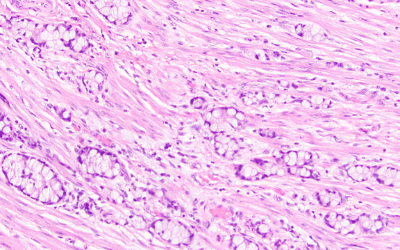Diagnosing appendix cancer can be difficult due to the lack of effective screening tests and the general nature of the symptoms. Currently, there are no blood or urine tests that can accurately diagnose appendix cancer.
Appendix cancer is typically identified during surgery for another condition. Alternatively, the cancer may spread to other parts of the abdomen and cause symptoms such as abdominal pain, bloating, fluid buildup, or other cancer-related signs like weight loss and fatigue. In such cases, a doctor may take a biopsy of the appendix to confirm if it is indeed cancer.
Due to its unique structure, appendix cancer can be difficult to detect through imaging tests like CT scans. Unlike a traditional tumour, which forms a ball of cells, appendix cancer grows in thin layers that can be hard to distinguish. As John Paul Shen, MD¹ explains, “Think about it like if you painted the walls of a room with cancer; that’s kind of what appendix cancer does”. Therefore, early detection is key for successful treatment and a good prognosis.
References
Appendix Cancer: An Elusive Diagnosis
Chadwick, D. (2020, August 26). Appendix Cancer: An Elusive Diagnosis. Cure. Retrieved February 7, 2023, from https://www.curetoday.com/view/appendix-cancer-an-elusive-diagnosis
Management of Appendix Cancer
Kelly KJ. Management of Appendix Cancer. Clin Colon Rectal Surg. 2015;28(4):247-255. Retrieved February 7, 2023, from doi:10.1055/s-0035-1564433
Continued increasing incidence of malignant appendiceal tumors in Canada and the United States: A population-based study
Singh H, et al. Continued increasing incidence of malignant appendiceal tumors in Canada and the United States: A population-based study – wiley online library. ACS Journals. Retrieved Februaruy 7, 2023 from doi:10.1002/cncr.32793
¹ 4 appendix cancer questions, answered
Van Thomme, G. (n.d.). 4 appendix cancer questions, answered. University of Texas MD Anderson Cancer Centre. Retrieved February 7, 2023, from https://www.mdanderson.org/cancerwise/4-appendix-cancer-questions-answered.h00-159463212.html
You might also like to read…
How’s PMP diagnosed?
Pseudomyxoma peritonei is usually found during an unrelated procedure such as during an operation for something else.
What is the main cause of appendix cancer?
The exact cause of appendix cancer is not yet known, and no avoidable risk factors have been identified so far.
Is pseudomyxoma peritonei curable?
The question we’d all like answered!



